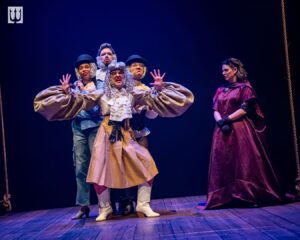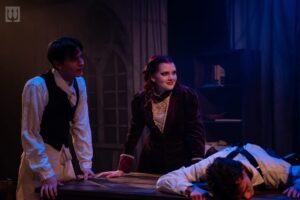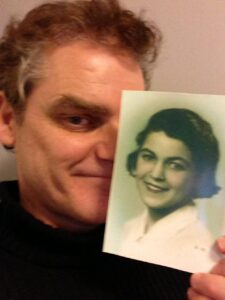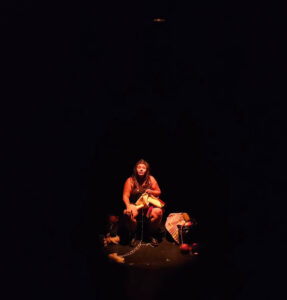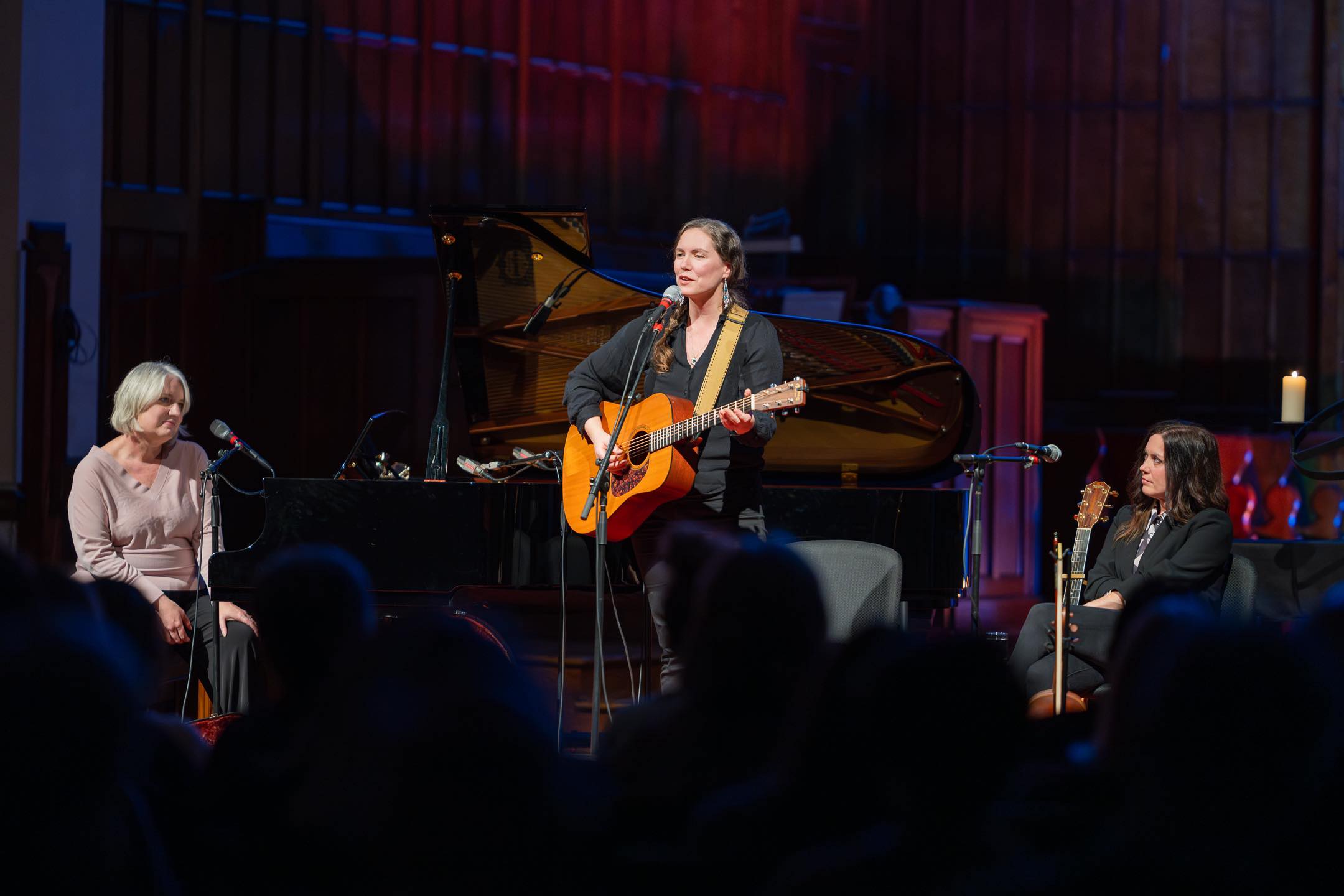
Erin Costelo, Catherine MacLellan, and Lisa MacIsaac. Photo by Daniel Hewett.
On November 19th I attended the inaugural Women in Song Songwriters’ Circle produced by Banshee Events Co. at the Stage at St. Andrew’s Church. This is a brand new initiative from Madison Violet’s Lisa MacIsaac, the first of a concert series that will continue throughout 2024, and features female and non-binary songwriters in a songwriters’ circle format. On the 19th we were treated to music from East Coast artists Erin Costelo, Catherine MacLellan, and MacIsaac herself.
Erin Costelo is a singer, songwriter, and a music producer. Her 2016 album Down Below, The Status Quo was nominated for twelve local awards, and won an ECMA for R&B/Soul Recording of the Year. She was also the first woman to win Music Nova Scotia’s Producer of the Year award in 2017. Her newest album is Sweet Marie, released in 2018.
Costelo accompanied herself masterfully on the piano, immediately filling the entire church with her huge soulful voice. I have seen Costelo perform before at ECMA, and once I happened to catch a set of hers by chance on the Halifax waterfront, and her songs always hook me immediately from the very first note. I have been obsessed with her fun and boppy “Oh Me Oh My” from We Can Get Over (2012) since I first heard Karen Lizotte’s cover version in Neptune’s Argyle Street Kitchen Party (it’s always my favourite moment of that show), so I was thrilled to (finally) get to see Costelo perform it herself. The lyrics are a funny mix of someone dreaming about an idyllic future with someone, while also suggesting that the dealbreaker in the relationship may have already arrived. Costelo explained the story behind the writing of the song, which adds clarifying context. This is one of the reasons that I love the songwriter circle format so much, as it tends to shine the light more firmly on the artists’ writing processes than a more conventional concert might.
One of the things that Costelo does sometimes when she is writing which I find fascinating is that she writes certain songs from the perspective of a character other than herself. For example, during her ECMA showcase in 2017 she mentioned that she wrote her song “The Line” in the style of a Bob Dylan song being sung by Nina Simone. On the 19th she mentioned that she wrote her song “Fighter” as a song that Merry Clayton might have written for herself to sing. “Fighter,” she croons gorgeously, “Where do you go when the war is won?” This rousing anthem is an eleven o’clock number if I ever heard one. I bet Merry Clayton would love it.
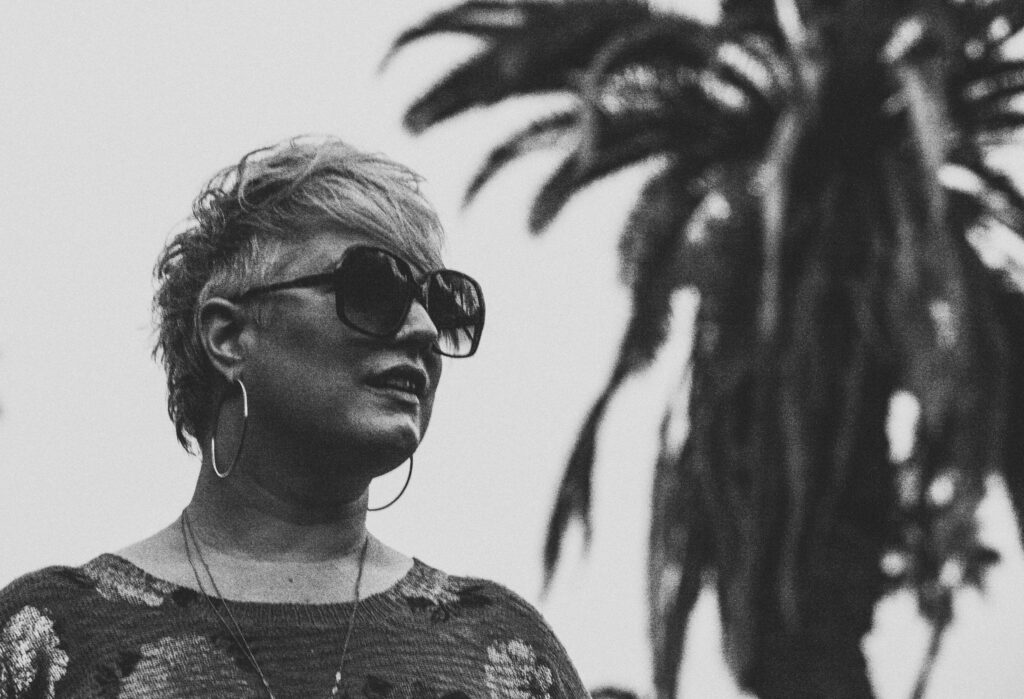
Costelo also performed “Turn It On,” also from Down Below, The Status Quo, which she mentions is a song that she really likes and is very proud of, but it isn’t one that is as well known as some of her others. I find this is also a benefit to the songwriters’ circle format, especially a circle like this one that is providing a supportive and nurturing space for artists to try out new work for the first time, or to explore beyond the familiar tread of audience expectations. Audiences are treated to music that they may have overlooked or missed out on, or they have the chance to be first audiences for brand new songs just finding their legs. Costelo also performed the title song from We Can Get Over, a favourite of her father’s, another gigantic ballad that makes you want to crawl into her voice and burrow into it like a woodland animal hibernating for the winter.
Catherine MacLellan is a Juno Award winning singer-songwriter who hails from Prince Edward Island, and she has nine albums, the newest of which are Coyote (2019) and Holiday, an EP, (2021). The latter is a seasonal album, so it’s the perfect time to add that to your playlists! Like Costelo MacLellan is also a music producer; she worked as the engineer, producer, and side musician on Holiday. The holiday record includes festive favourites and a new song she wrote called “Calling You Home (for the Holidays)”, which came out of the first Pandemic Christmas in 2020.
I have seen Catherine MacLellan perform a few times at ECMA and I am always struck by how much her voice sounds exactly like how I imagine 1960s coffeehouses sounded. Her voice is so bright and clear, and it has this inherent optimism or buoyancy to it that evokes for me a time and a generation far less cynical than the one we are currently experiencing. She makes me believe that everything is going to be okay. She mostly sang songs from Coyote, beginning with “Waiting On My Love,” a song that she says reads like a typical love song, but is actually more about learning to be more gentle with oneself and finally saving some of the love in her heart for herself. “One foot in front of the other/ that’s how we must go/ one step ahead of the next/ we’ll get there nice and slow,” her voice soars with beautiful self assurance and you can feel the joy that she’s cultivating in this gentleness and care with herself.
I’ve seen MacLellan songs described as being “from the land” and certainly a song like “The Tempest,” about the experience of fishers, is one that you could imagine a woman of Prince Edward Island singing as she paced along the shore in her long skirts and shawl two hundred years ago. “Night Crossing,” is also about a close encounter with the ocean- this time a solo European ferry crossing. Here we can imagine MacLellan navigating this nighttime adventure, people watching, and finding sleep elusive, as the scenery all around melds from the pitch black night to the beautiful dawn.
MacLellan writes a lot of songs about very specific relationships in her life, and she titles these songs with the names of the people she is writing about. This is such a beautiful open-hearted way to write- in many cases crafting these beautifully poetic love songs specifically for one other person, but allowing the world to take the song and experience it in their own way. “Isabel’s Song” from the 2009 album Water In the Ground, was written as a love song of a single mother to her young daughter. As the daughter of a single mother myself, I find I can hear a lot of my mom’s experience in her lyrics. “I don’t know what I would do without you/ my life has changed it’s true/there’s is no going back after you/ love ohh/ love ohhh/love” resonate especially poignantly when there is a mixture of difficulty in that change, of raising a child on your own, but knowing that you still wouldn’t change your life for the world.
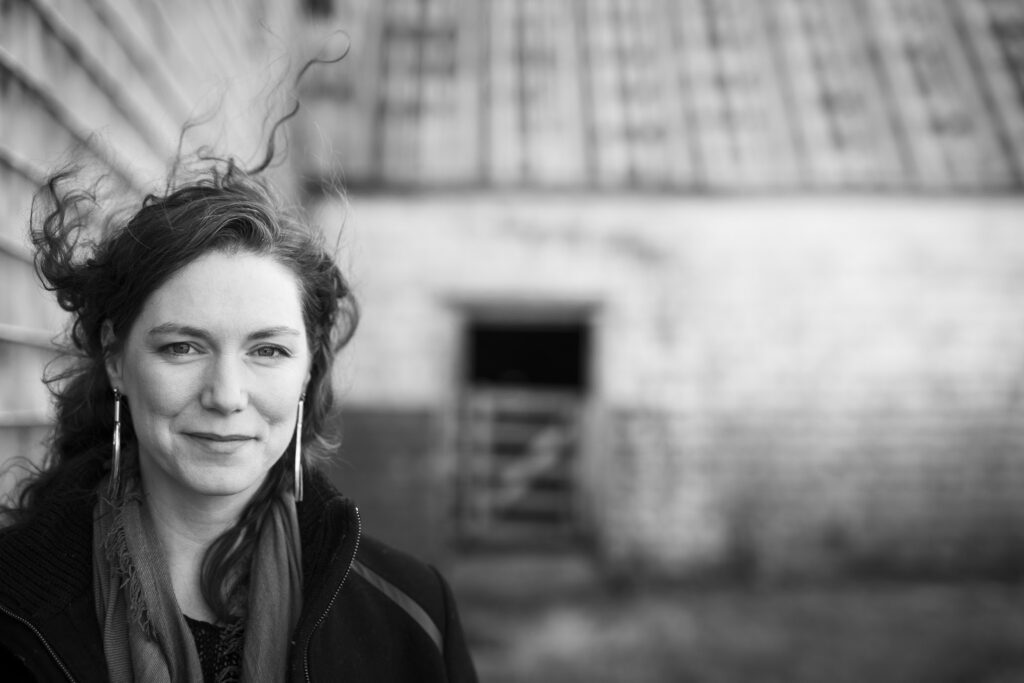
My favourite song that MacLellan sang at the songwriters’ circle was “Emmet’s Song,” written for her transgender nephew. The first line is, “Too many times you’ve been stopped in your tracks/now there’s no going back/I’m taking you with me.” The entire song feels exactly like what the story is: the scooping up of a beloved young person by their protective auntie so that they can live somewhere where they truly and wholly belong. It always makes me cry, because isn’t that just the world where you want to live: where aunties who see you for exactly who you are exist and they are there to help you navigate the world, and they themselves are transformed for good from the experience as well? Gorgeous.
Lisa MacIsaac, who is from Creignish in Cape Breton, almost always performs with her bandmate Brenley MacEachern as Madison Violet, and together they have released eleven albums, the most recent of which is Eleven (2022), which they also produced themselves. They are a multi-award-winning, and Juno Award nominated duo, and they were the 2010 recipients of the very prestigious Song of the Year award in the John Lennon Songwriting Contest for “The Ransom.” Their songs are beautifully constructed around the evocative harmonies that their voices create together, which gives them their distinctive sound. However, MacEachern wasn’t able to attend this songwriters’ circle, due to a death in her family, and so MacIsaac sang five Madison Violet songs on her own, which she mentioned was quite nerve-racking to do. She did such a brilliant and beautiful job. I likened it to hearing a band’s acoustic or stripped-down version of a favourite song of theirs, it’s different, but just as good in its own unique way. This is especially impressive since MacIsaac tends to sing more of the harmonies, and less of the verses of Madison Violet’s songs, but it made it even more special to get to hear her sing parts she normally doesn’t sing at all.
She sang “Ohio” from The Knight Sessions (2016), which was written about a time when she was touring with Dream a Little Dream with Denny Doherty. It makes sense that since Madison Violet has toured the world so extensively over the last two decades they write a lot of songs rooted in the geography of a certain place (and sometimes places that you might not expect!). The narratives in Madison Violet songs are usually less overt and allow the listener to give the song their own interpretation. But the backdrop in this story of a relationship that seems to have become worn down, is vividly Shaker Square in Ohio, and “they never turn the lights down there.” The storyline of “Lauralee,” a more country-folk style song that makes me want to dance in a barn, is more overt. Lauralee is “running the roads,” as my mother would say, chasing after boys in her tight dress, much to the consternation of her mother. “You’ll find another lover/and hide him from your mother/sneak out the back/keep it under covers/ don’t go telling lies to me, Lauralee.” This song also features MacIsaac’s signature fiddle, which is even more challenging to do when you’re the only person singing the song. For me, in this song what intrigues me is what the narrator’s relationship is to Lauralee. What lies is she telling to them and in what context?
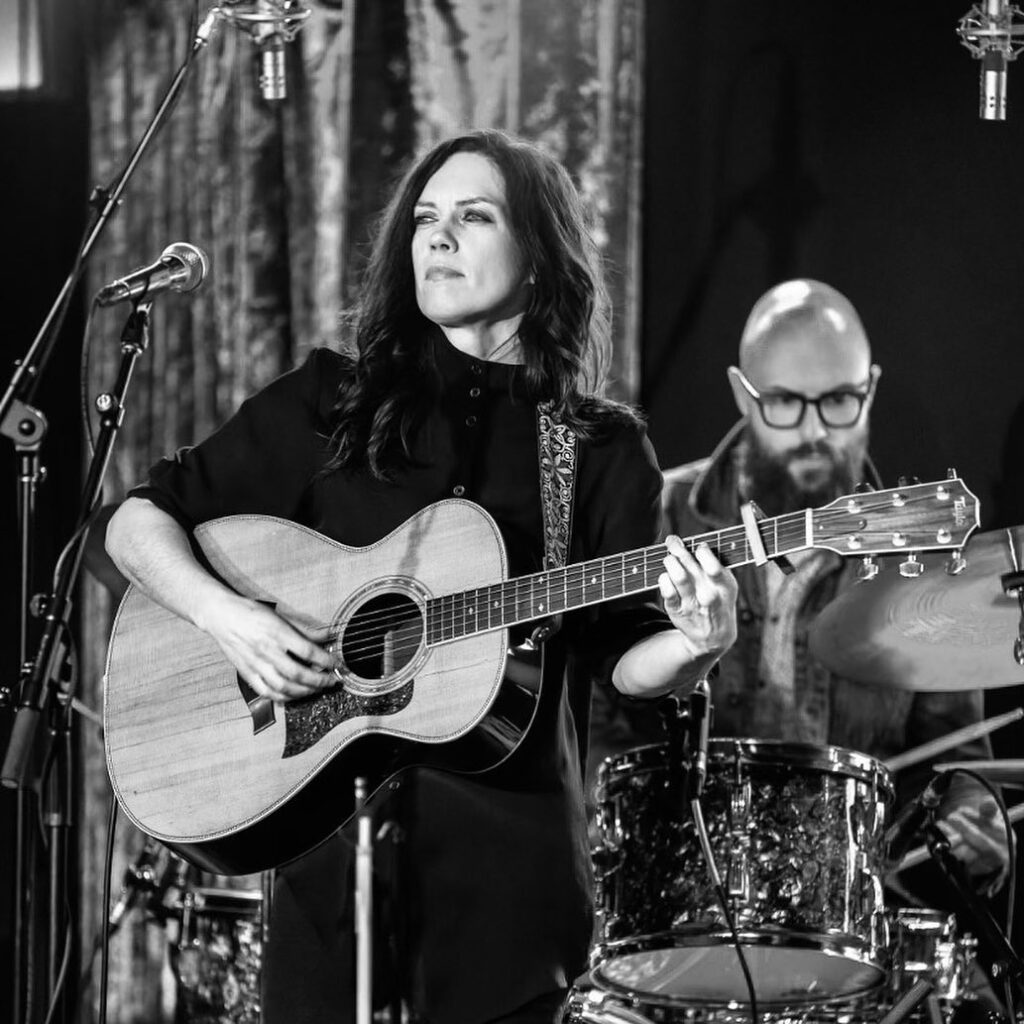
MacIsaac also played a gorgeous slow air on her fiddle in the memory of her dad, Angus MacIsaac, who passed away early last year. Her dad was also a fiddle player and his influence as a musician helped to nurture the musical talents of both Lisa and her older brother Ashley.
MacIsaac also sang “Here for You to Love” from Madison Violet’s most recent album, a song that seems to be about a breakup where one person is still remaining here for the other one to change their mind and find them. The line that always leaps out at me in this song is: “I just wanna stop/you from giving me/ away/if I knew that I could weather/all the stories that you said were not mine.” “All the stories that you said were not mine.” Oof. That’s one of those lines that can punch the listener right in the guts with its familiarity.
The other benefit to a songwriters’ circle is that each of the artists joins in with, often impromptu, harmonies, on each other’s songs, and watching Costelo, MacLellan, and MacIsaac seamlessly do this was incredible. Also, when you hear all these songs sung with just piano and/or guitar with just a sprig of fiddle, it’s easier to appreciate the mastery of the songwriters and how beautifully constructed these songs are, without requiring a lot of fancy digital tricks and technology.
It’s wild to think that in 2023 I had noticed, especially over the last five years or so, the gender disparity that still often exists once the spotlight is placed on the songwriter, or songwriting, within the music industry here, and more broadly. Costelo mentioned that it is so rare for her to be on a stage full of other women, other female songwriters, rather than being the one (token) woman in a roster full of men. What Lisa MacIsaac is doing here with Banshee Events Co. is, frankly, overdue, and a most welcome and important initiative here in Nova Scotia. I look forward to attending many more of her Songwriters’ Circles in the New Year (and beyond?!).
Follow Banshee Events Co. on Facebook for more information about this series. You can find Erin Costelo, Catherine MacLellan, and Madison Violet‘s music on their websites, and also anywhere that you buy or stream your music.

